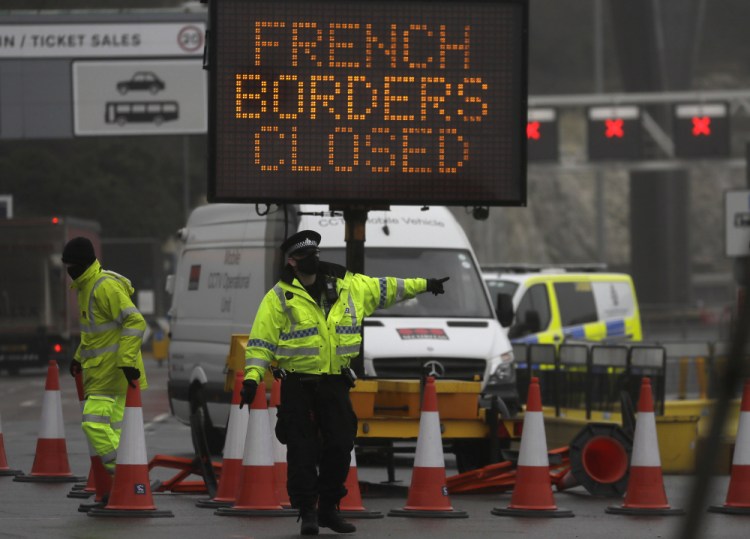LONDON — Over 2,800 stranded truck drivers hoped to get the green light Tuesday to leave Britain and get back home for Christmas as the country found itself increasingly isolated and its trade bottled up, cut off by neighbors afraid of a new strain of the coronavirus circulating in England.
More than 630 trucks snaked along a major highway in southeast England near the English Channel ports, while almost 2,200 others crowded into an unused airport on Day 2 of an ordeal that began when dozens of nations banned flights from the U.K. and France barred entry to its trucks.
The precautions were prompted by a new variant of the virus that is believed to be more contagious, though experts say it does not appear to be more deadly or vaccine-resistant. A similar one has emerged in South Africa.
On an island nation that relies heavily on its commercial links to the continent, the travel bans stoked fears of food shortages over Christmastime.
At the same time, Britain is witnessing an alarming rise in infections, with a record 36,800 reported on Tuesday, and is facing deep uncertainty over its final exit from the European Union in less than two weeks. Despite the looming deadline, the country has yet to work out its post-Brexit trade arrangements with the EU.
“What is so bad to me, is not just this new mutation, but the fact that we have been so bad at dealing with the pandemic, and it now looks like we’re heading for what’s called a perfect storm with the mutation 70% more infectious and Brexit all at the same time,” said 73-year-old Jim Gibson of London.
“People are really struggling to get their heads round one of these, let alone both — and now we’re being told we may have eaten our last lettuce for three months, too, probably.”
For the drivers, it has been a grim couple of days, with some complaining about the lack of toilet facilities and food.
“My family is waiting for me, my children, my daughter, my son, my wife,” said Greg Mazurek of Poland. “It was supposed to be a very quick trip, three to four days max. I spent in the U.K. 10 minutes in the gas station and 20 minutes unloading, and now I need to wait two days here in the port in Dover.”
Drivers held out hope the ordeal might end within hours. The prospects seemed to improve Tuesday when the EU’s executive arm recommended a lifting of the bans.
The European Commission said people returning to their home countries should be able to do so provided they test negative test for the virus or quarantine. It said that “cargo flows need to continue uninterrupted.”
Discussions continued between Britain and France, with any solution likely to center on the testing of drivers for the virus.
Given that around 10,000 trucks pass through Dover every day, accounting for about 20% of the country’s trade in goods, retailers became increasingly concerned.
Andrew Opie, director of food and sustainability at the British Retail Consortium, warned of potential shortages of fresh vegetables and fruit after Christmas if the borders are not “running pretty much freely” by Wednesday.
The problem, he explained, is that the empty trucks sitting in England can’t reach the continent to pick up deliveries for Britain.
“They need to get back to places like Spain to pick up the next consignment of raspberries and strawberries, and they need to get back within the next day or so, otherwise we will see disruption,” he said.
The virus is blamed for 1.7 million deaths worldwide, including more than 68,000 in Britain, the second-highest death toll in Europe, behind Italy’s 69,000.
Over the weekend, Prime Minister Boris Johnson imposed strict lockdown measures in London and neighboring areas amid mounting concerns over the new strain. He scrapped a planned relaxation of rules over Christmastime for millions of people and banned indoor mixing of households. Only essential travel will be permitted.
Amid questions about whether the vaccines being rolled out now will work against the new strain, Ugur Sahin, chief executive of BioNTech — the German pharmaceutical company behind the Pfizer-BioNTech shot — said he is confident it will be effective, but further studies are needed to be sure.
In Switzerland, meanwhile, authorities are trying to track an estimated 10,000 people who have arrived by plane from Britain since Dec. 14, and has ordered them to quarantine for 10 days. Switzerland was one of the 40-odd countries to ban flights from Britain over the new strain.
The quarantine order is likely to affect thousands of Britons who may have already headed to Swiss ski resorts. Unlike many of its neighbors, Switzerland has left most of its slopes open, attracting enthusiasts from around Europe.
“Do not leave your room or residence and avoid all contacts,” Switzerland’s public health agency urged vacationing Britons and South Africans. It warned they face potential fines of 10,000 Swiss francs ($11,250).
___
Jo Kearney in Dover, Lorne Cook in Brussels and Frank Jordans in Berlin contributed to this report.
Send questions/comments to the editors.



Success. Please wait for the page to reload. If the page does not reload within 5 seconds, please refresh the page.
Enter your email and password to access comments.
Hi, to comment on stories you must . This profile is in addition to your subscription and website login.
Already have a commenting profile? .
Invalid username/password.
Please check your email to confirm and complete your registration.
Only subscribers are eligible to post comments. Please subscribe or login first for digital access. Here’s why.
Use the form below to reset your password. When you've submitted your account email, we will send an email with a reset code.